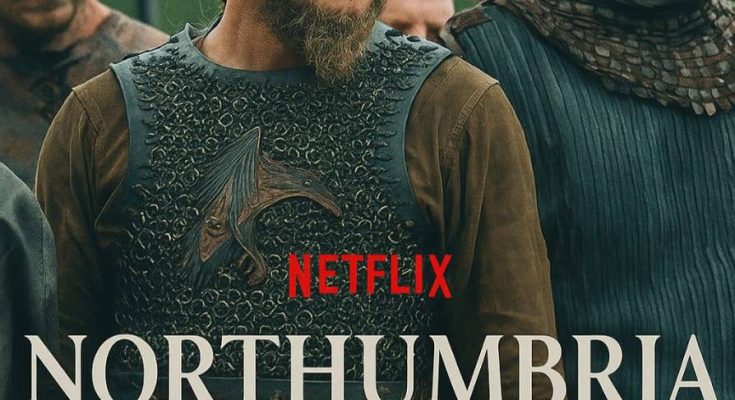The highly anticipated Northumbria movie has finally arrived, and in just a short period of time since its release, it has already begun to break records across the film industry. From its early previews to its official launch in cinemas and streaming platforms, the movie has been the center of conversation in both entertainment circles and among casual viewers who were eager to witness the cinematic spectacle that had been teased for years. Northumbria is not just another historical epic, nor is it merely a regional tale about a forgotten kingdom—it has managed to establish itself as a global phenomenon, blending mythology, history, human struggle, and cinematic artistry into an experience that has resonated with millions of viewers worldwide. Its box office performance has already outpaced expectations, critics have lavished it with praise, and fans have flocked to theaters in record-breaking numbers, making it one of the most talked-about film releases of the decade.
At its core, Northumbria tells a sweeping story rooted in the rich and turbulent history of the ancient Anglo-Saxon kingdom. The film does not simply retell battles and dynastic struggles; it dives deep into the lives of its characters, weaving together personal sacrifices, legendary heroes, betrayals, and the clash of cultures during a transformative period in European history. The script, which had been in development for nearly a decade, was carefully researched, drawing from historical chronicles, Norse sagas, and Anglo-Saxon poetry. Yet, the filmmakers were not content with a straightforward historical retelling—they infused the story with a cinematic grandeur that elevated it beyond a niche period drama, creating something that feels timeless and universal.
The sheer scale of Northumbria has been one of the factors driving its success. From breathtaking battle sequences filmed with thousands of extras to sweeping aerial shots of rugged coastlines and haunting forests, the cinematography has been described as nothing short of majestic. Filmed across the UK and parts of Scandinavia, the landscapes themselves have become characters in the film, reinforcing the sense of grandeur and isolation that defined the early medieval world. Viewers have repeatedly commented on how immersive the movie feels, with the cold winds, crashing waves, and dark skies almost seeping through the screen.
But beyond its technical brilliance, the film’s heart lies in its performances. The cast, a combination of established stars and rising talents, has been universally praised for their portrayals. The lead actor, who embodies the conflicted Northumbrian warrior-king, has delivered a career-defining performance—raw, vulnerable, yet commanding. His journey, torn between loyalty to his people, personal ambition, and the larger forces of destiny, has struck a chord with audiences who see reflections of universal struggles in his story. Supporting actors, including a fierce shield-maiden inspired by both historical and legendary figures, and a scheming noble whose betrayal shapes the arc of the film, have also been highlighted by critics as delivering some of the most memorable performances of recent years.
The writing of Northumbria balances spectacle with intimacy. While it features grand set pieces—such as a massive naval battle staged on the North Sea, complete with authentic reconstructed longships—it also devotes time to quiet, contemplative moments. The film does not shy away from the spiritual dimension of the age, portraying the tensions between the old pagan traditions and the rising tide of Christianity. This thematic depth has resonated with global audiences, who see in the film not just an exploration of medieval politics but also an examination of faith, identity, and the human desire for meaning in a world of uncertainty.
The record-breaking aspect of the film has been nothing short of extraordinary. Within its opening weekend, Northumbria smashed domestic and international box office records, surpassing projections by wide margins. Industry experts initially expected it to perform strongly in Europe, given its subject matter, but were surprised to see how well it has been received in markets like North America, Asia, and Latin America. In the United States alone, it has already surpassed the opening weekend totals of several major franchises, a feat that no historical drama has achieved in decades. Its success has been attributed to a combination of powerful marketing, positive word of mouth, and the film’s ability to appeal across demographics, from history enthusiasts to fans of epic storytelling in the mold of Lord of the Rings or Gladiator.
On streaming platforms, Northumbria has also shattered records. As soon as it became available for digital release, it quickly climbed to the top of charts worldwide. The film’s streaming numbers have outpaced even some of the most highly anticipated superhero and science-fiction releases of recent years, showing that audiences are hungry for new types of epic storytelling that go beyond the traditional blockbuster formula. Analysts have noted that the film’s blend of gritty realism, emotional depth, and mythic resonance has filled a gap in the market, proving that audiences still crave grand historical narratives when they are executed with vision and authenticity.
Another element that has driven Northumbria’s unprecedented success is its cultural impact. Social media has been flooded with fan art, discussions, and breakdowns of the movie’s historical and mythological references. Online communities have dissected every frame, speculating on which historical figures inspired certain characters, while others have praised the authenticity of the weaponry, armor, and settings. The film has sparked renewed interest in the history of early medieval England, with book sales on the period skyrocketing in the weeks following the release. Tourism boards in regions associated with the ancient kingdom of Northumbria have reported a surge in visitors, eager to explore the landscapes and ruins that inspired the film’s setting.
The soundtrack has also become a sensation in its own right. Combining traditional instruments with modern orchestration, the score has been praised for its ability to evoke both the grandeur of battle and the intimacy of personal struggle. Fans have described it as haunting, powerful, and unforgettable. Several tracks have already gone viral, with listeners using them in social media edits, workout playlists, and even academic lectures. The music has further solidified the movie’s position as not just a film but a cultural event that transcends the screen.
Industry insiders are already speculating on the long-term legacy of Northumbria. Awards season is expected to be dominated by the film, with predictions that it could sweep categories ranging from Best Picture and Best Director to acting, cinematography, and sound design. Comparisons are being made to previous epic films that redefined the industry, such as Braveheart and Gladiator, but many argue that Northumbria has carved out a unique identity that will influence historical cinema for years to come. Its success may also lead to a resurgence of interest in films exploring other early medieval cultures, potentially opening the door for a new wave of epic storytelling rooted in real history rather than fantasy.
What sets Northumbria apart, however, is its emotional resonance. Viewers have not only been dazzled by its visuals and enthralled by its action but also deeply moved by its characters’ journeys. The themes of sacrifice, loyalty, betrayal, and faith are timeless, ensuring that the movie speaks not only to lovers of history but to anyone who has wrestled with questions of duty, love, and mortality. Audiences have left theaters in tears, inspired, or in deep reflection, with many returning for multiple viewings to experience the story again.
As the film continues its run, breaking more records with each passing week, it is clear that Northumbria has become more than a movie—it has become a cultural landmark. It has proven that historical dramas can captivate the world when handled with care, ambition, and artistry. It has united fans across continents, sparked discussions about history and myth, and demonstrated the enduring power of cinema to transport audiences into other times and worlds while reflecting back on the human condition.
The phenomenon surrounding Northumbria shows no signs of slowing down. Merchandise is flying off shelves, academic panels are being organized around its themes, and rumors are already swirling about potential sequels or spin-offs. Whether or not the filmmakers choose to expand the story, what has already been accomplished is nothing short of historic. Northumbria has broken records, captured imaginations, and reminded the world why cinema remains one of the most powerful art forms.
In the end, the story of Northumbria is not just about kings, battles, or a distant past—it is about the enduring struggles that define humanity. Its ability to merge spectacle with soul, history with myth, and entertainment with meaning has created a once-in-a-generation cinematic event. For audiences around the world, it is not simply a movie, but an experience they will carry with them for years to come. Northumbria has proven that when vision, artistry, and storytelling align, the result is nothing less than legendary.



